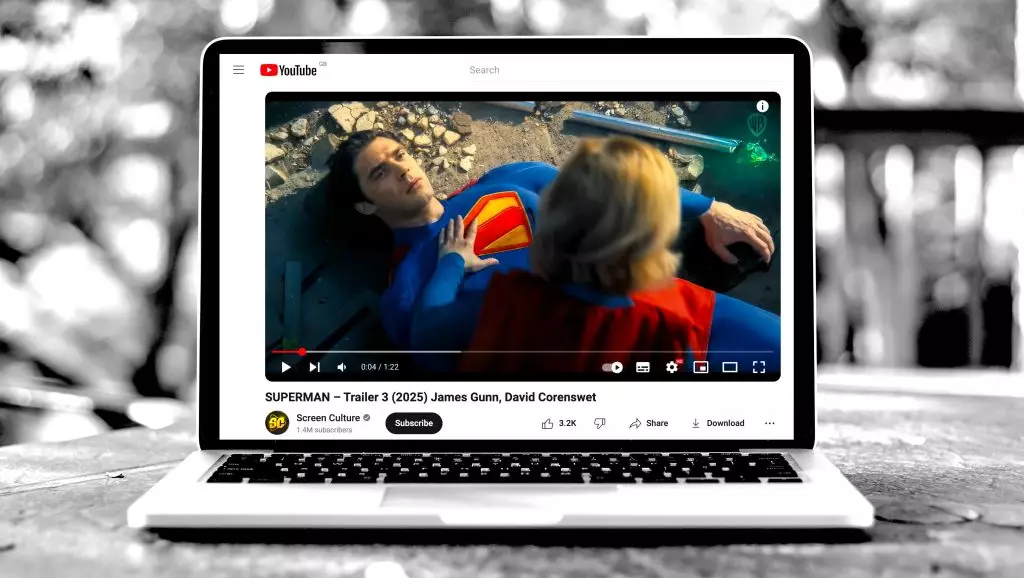The evolution of technology has inevitably permeated every facet of our lives, transforming industries and redefining the way we consume content. YouTube, a colossal platform for entertainment, has recently witnessed a remarkable rise in AI-generated content, particularly in the realm of movie trailers. However, the line between creativity and copyright infringement is becoming increasingly blurry. This development raises pressing ethical and legal questions about the rights of creators and the responsibilities of platforms like YouTube.
Two channels, Screen Culture and KH Studio, have come under scrutiny for producing content that straddles this precarious line. While their outputs are undeniably sleek and polished—paralleling official trailers for franchises like “Fantastic Four” and “Superman”—the essence of what they deliver is steeply rooted in imitation, augmented by AI-nurtured visuals and “what-if” scenarios. The danger lies in the deceptive allure of these trailers, which can confuse audiences and amplify the risk of misinformation.
YouTube’s Crackdown on Monetization
In an effort to rein in this trend, YouTube has disabled monetization options for both channels. This move sends a clear signal: the platform acknowledges that not all creative output warrants financial reward, especially when it may potentially mislead viewers. YouTube’s monetization policies explicitly emphasize that creators must significantly alter borrowed material to make it their own, a directive seemingly contravened by these channels, which often mimic existing content.
While the channels can appeal YouTube’s decision, it is clear that this new policy intent behind it is to uphold a level of integrity on the platform—a challenging task when AI tools permit rapid replication of established content, potentially diluting the original creators’ value in the process.
Cultural Impact and Audience Responsibility
Both Screen Culture and KH Studio claim their primary goal is to ignite imagination, rather than mislead audiences. KH Studio’s founder argues that the creative exploration of hypothetical movie concepts represents a form of artistic expression. While this angle is valid, it raises a critical issue: at what point does creative expression evolve into potential consumer fraud? Audiences today must cultivate a protective skepticism towards content produced under the guise of generative creativity.
The rise of AI-generated content also catalyzes a larger conversation about accountability in the digital landscape. We consumers bear a certain responsibility in recognizing that the allure of AI-driven creativity can often masquerade as authentic content. The fallacy is that AI technology can produce output lacking the human emotion and nuanced storytelling that accompany traditional filmmaking.
The Role of Established Studios
An alarming aspect of this situation is the complicity of major studios, like Warner Bros. Discovery and Sony, who, instead of outright condemning these channels, have reportedly encouraged YouTube to redirect any ad revenue generated by the AI trailers back toward them. This revelation suggests a disturbing alignment between the business motives of high-profile studios and the proliferation of misleading content. It not only questions their commitment to supporting original creatives but also hints at their willingness to manipulate market dynamics to their advantage.
Their silence and reluctance to comment on the policies reflect an underlying fear of an escalating war between traditional media and savvy digital creators leveraging cutting-edge technology. The veiled collaboration indicates that established entertainment entities recognize the potency of these channels to drive audience engagement, yet they remain unwilling to endorse the method behind their success.
The Evolving Landscape of Content Creation
As we navigate this new digital frontier, it becomes imperative that platforms, creators, and audiences collaboratively forge a more transparent landscape. When algorithms determine video rankings based on click-worthy content rather than authenticity, they perpetuate a cycle that rewards sensationalism over substance. This inevitably dilutes meaningful storytelling.
With the explosion of AI in content creation, we stand at a crossroads. Upholding ethical standards while embracing innovation must become a shared priority amongst all parties as they shape the future of entertainment. The ultimate challenge lies in fostering a culture of accountability where viewers engage thoughtfully with the content they consume while creators respect intellectual property and aim to push the boundaries of creativity—without the shadows of deception lurking behind.
